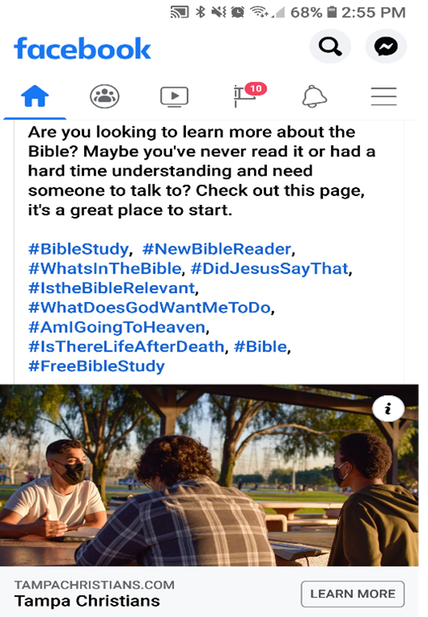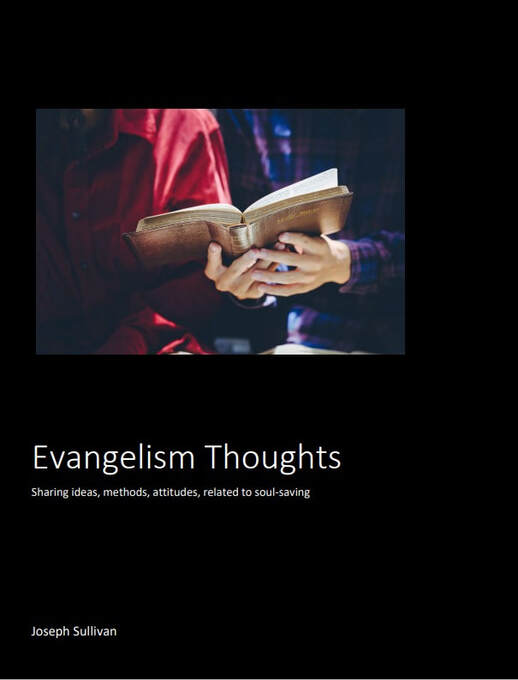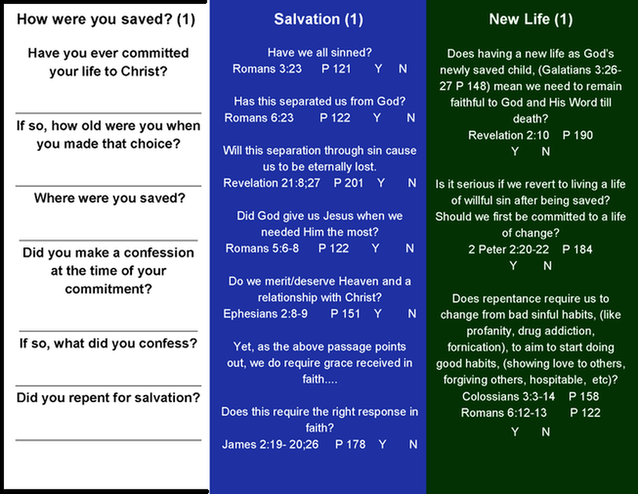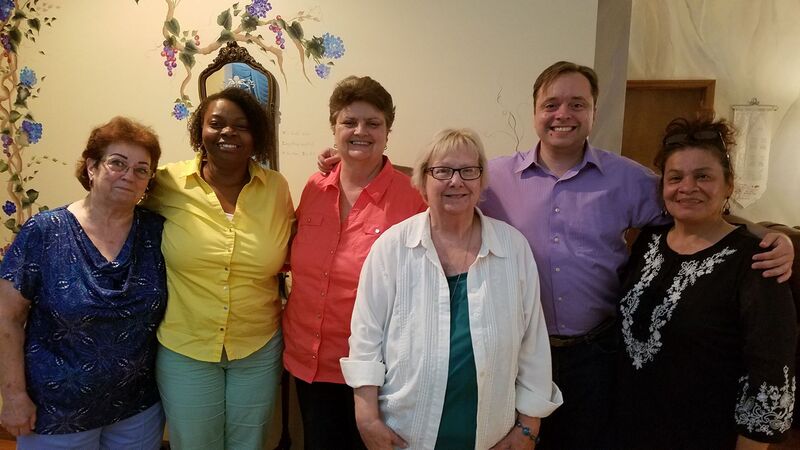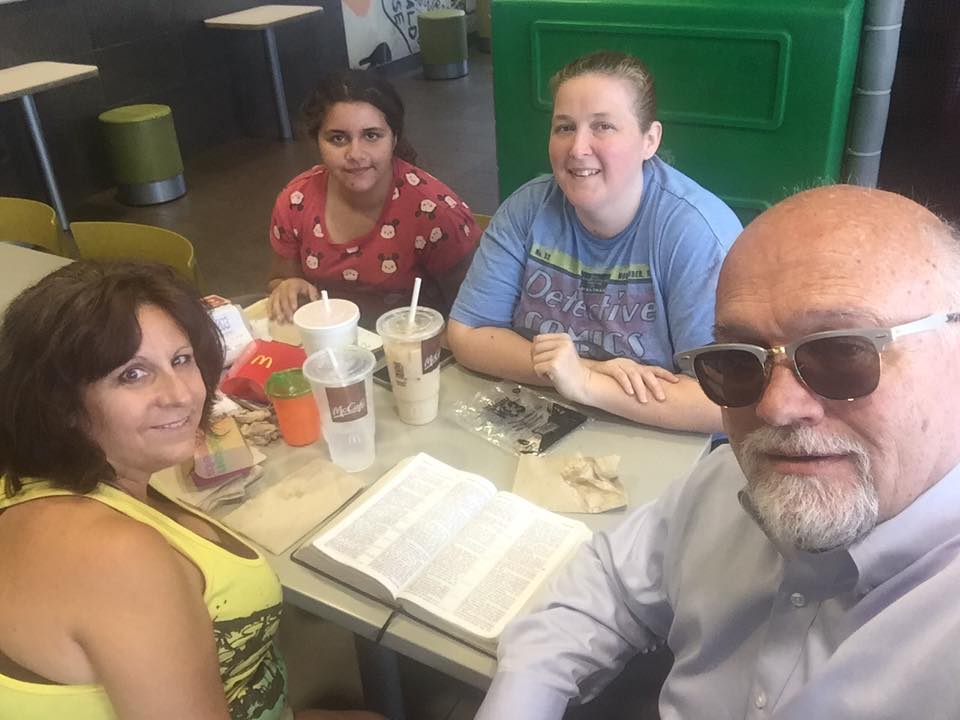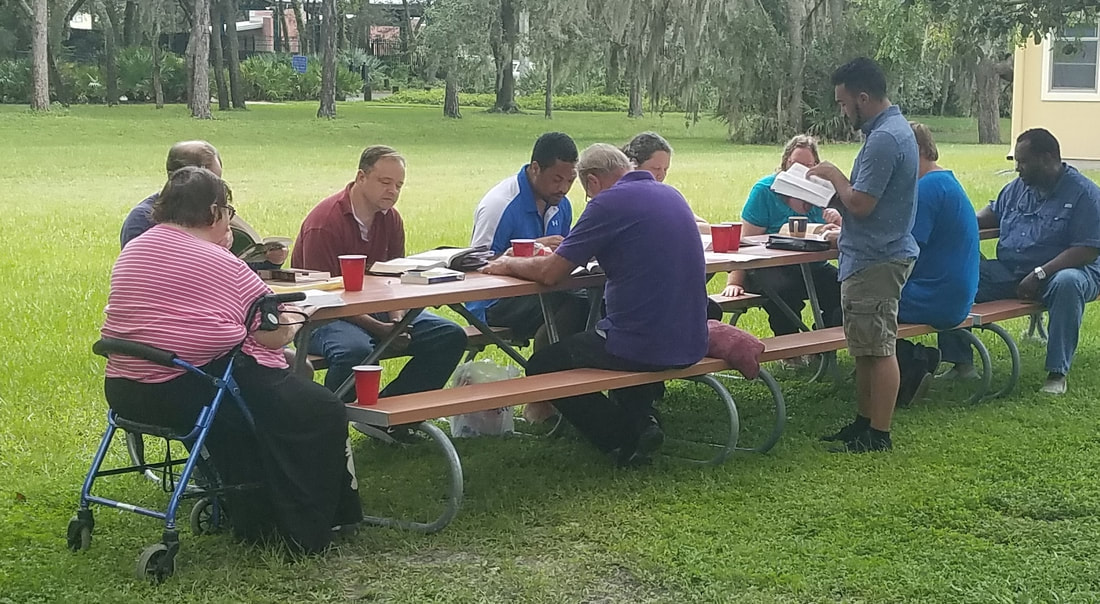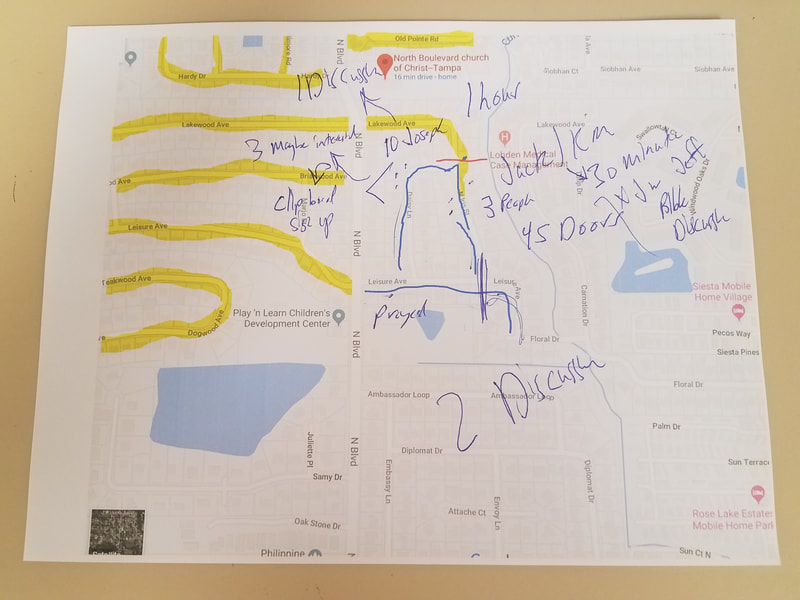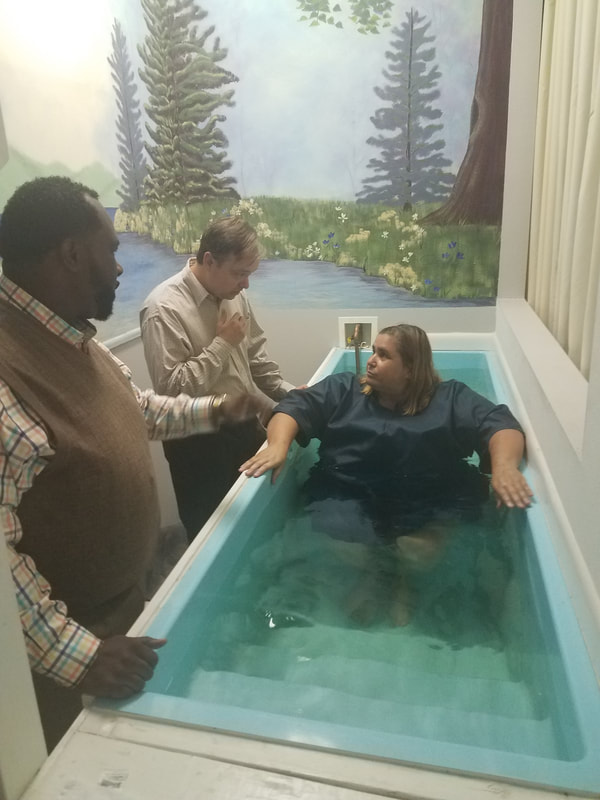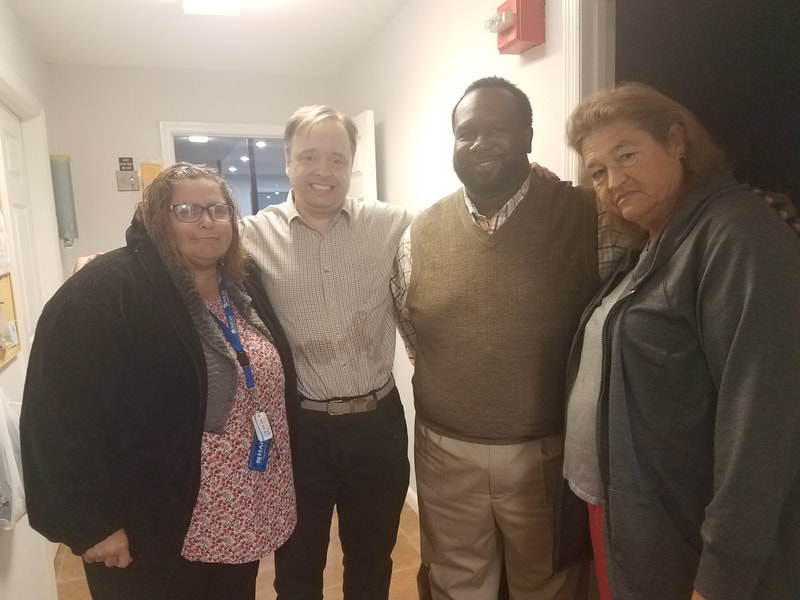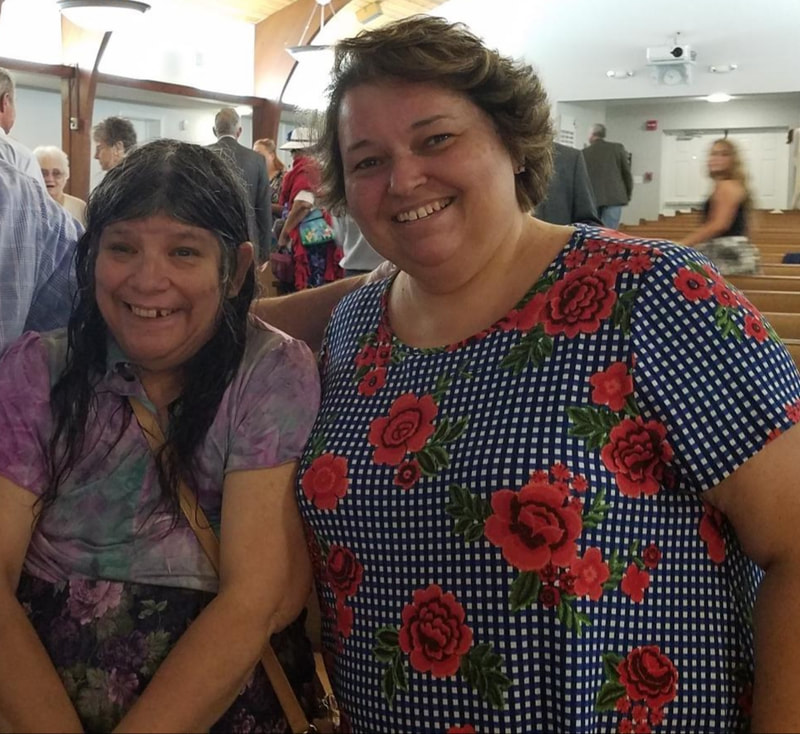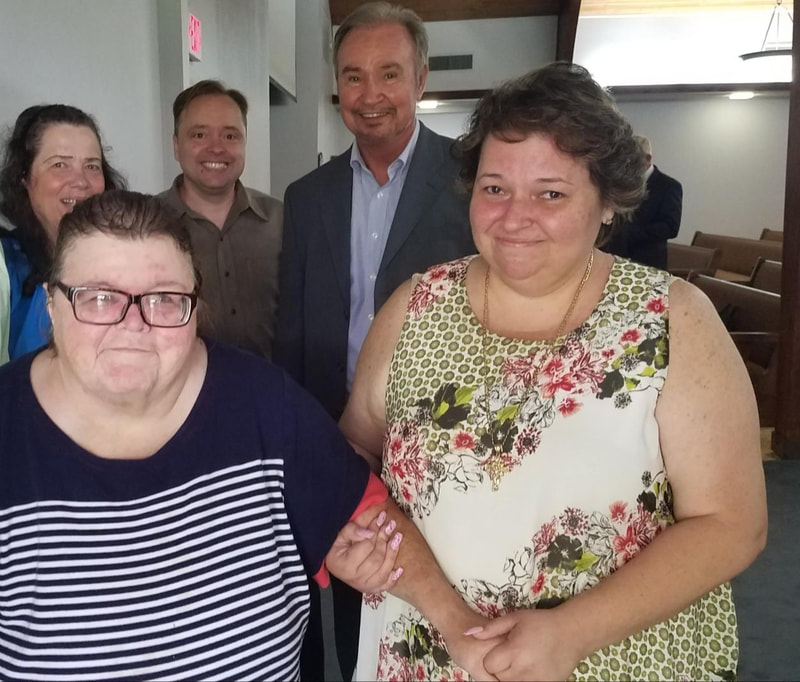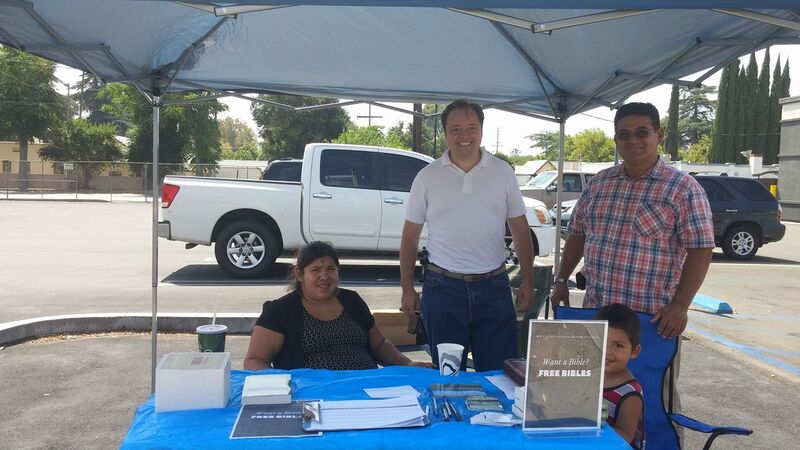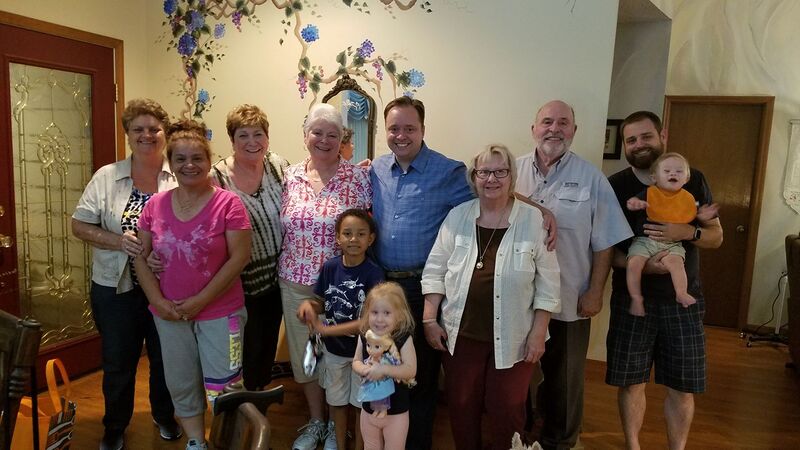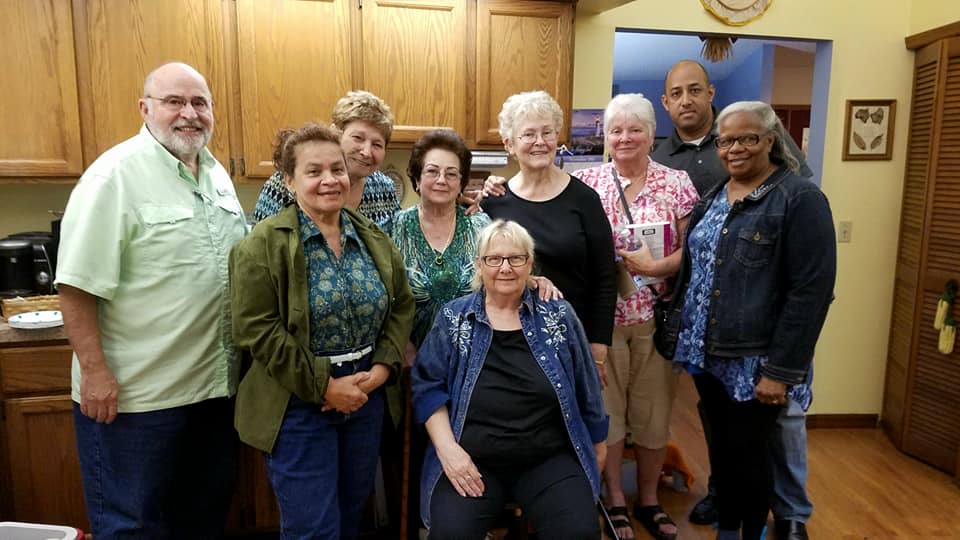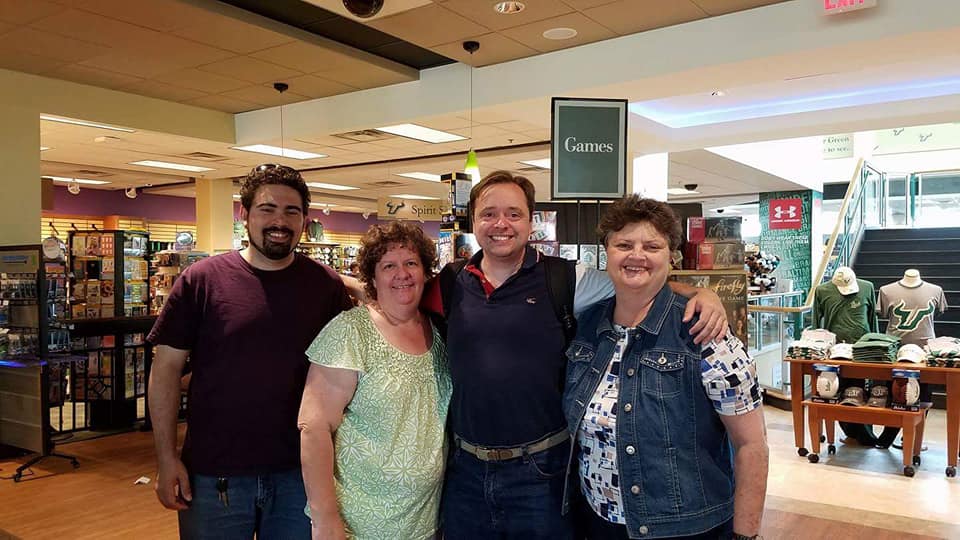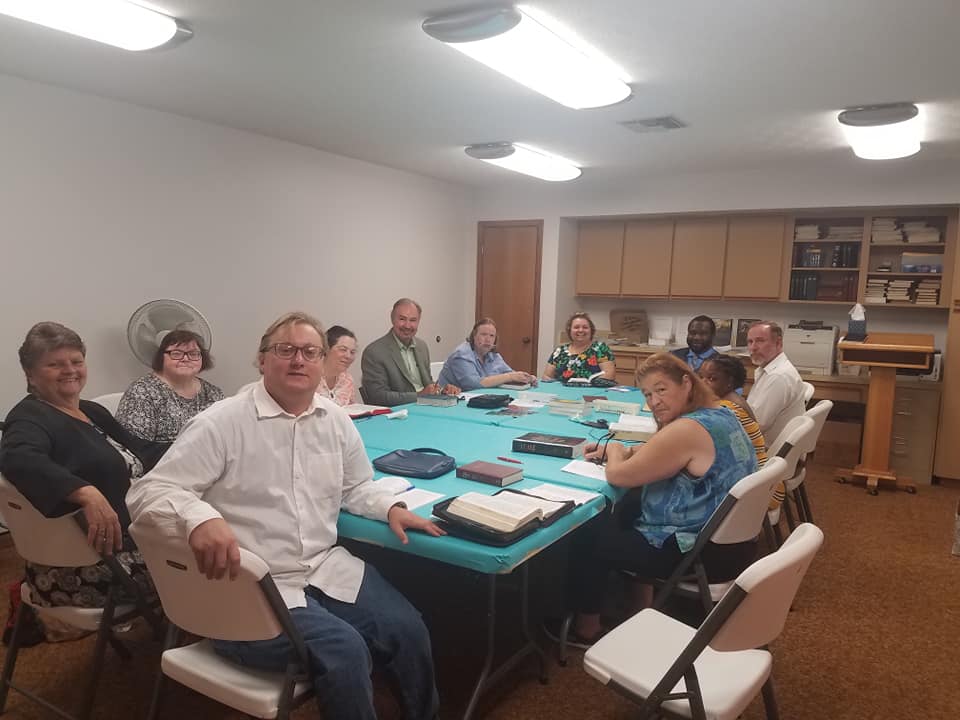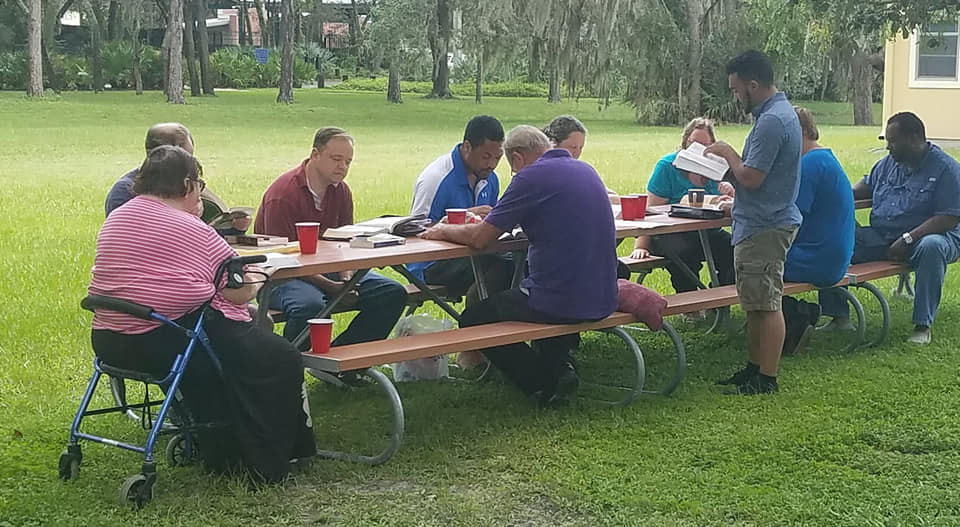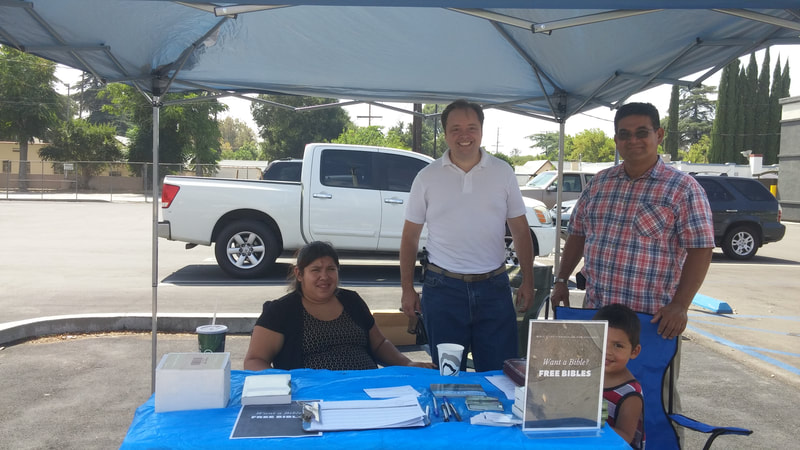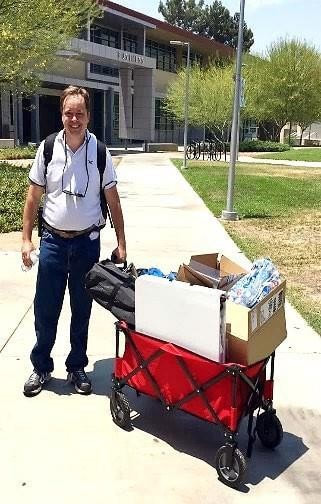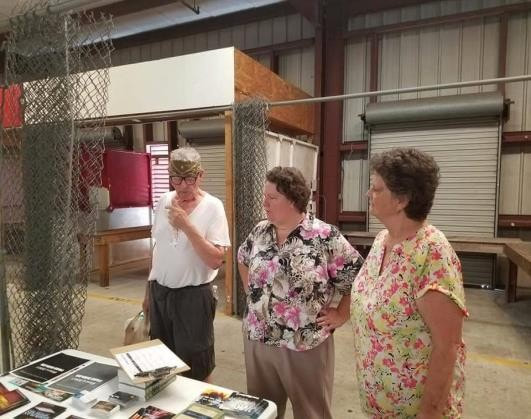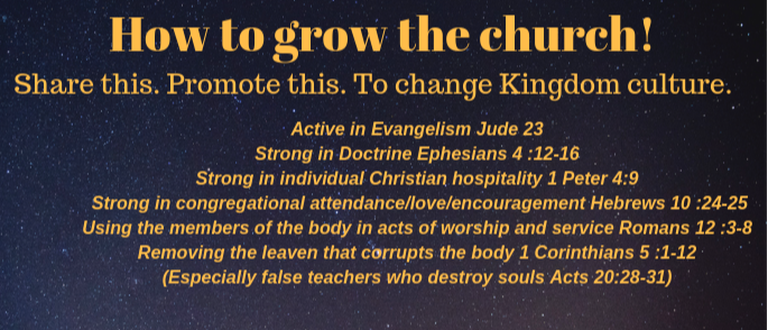Introduction to this evangelism strategy training page
|
|
Hello, my name is Joseph Sullivan. I am the owner of the COC evangelism website. I put together this template as a refresher, reminder, and guide to help me in the ideals and themes I wish to focus on in evangelism. But I also put this together to help you in your goals and aspirations in the evangelism work you are doing (or wish to begin doing). This page is designed to help you save souls, retain church visitors and new converts. The material on this template page can help create a winning strategy and grow one's local church. The material is extensive. I've put together a lot of written articles, videos and have shared my resources. I'll have a great deal of free/useful content outlined below. If you go through the material and focus on applying the strategies, you'll see results. Time/investment + effort/work + faith/prayer + good goal-setting/application = results/church growth/souls saved. Always be learning; always be hungry to learn. Always seek to improve. Let your learning curves be a blessing. For they teach. Let your success be given to God in gratitude, for our Father gives. Never be content with progress; always seek to grow and develop in evangelism. The content I have outlined below has helped me, and I know it can help you as well.
I pray our God blesses you in the service you yield to His name. Best wishes... In His Love, Joseph Sullivan |
How the content will be introducedThe evangelism strategy page will be broken down into three stages. The training segments will highlight themes for evangelism application in the areas of perspective and church readiness, mentorship and methodology. The last stage will highlight formats of teaching. This will include resources to help with class preparation, curriculum, and training.
|
The first stage:The first stage will detail the mindset a person should have in matters of evangelism. This attitude is also applicable to how a local congregation should view outreach. How should we view the lost? How are Christians supposed to look at the role of outreach in the Christian walk with God? If the mind is not ready, everything else will not fall into place. The heart has to be prepared for the evangelism work to flourish. I'll detail the mindset Christians and kingdom workers should have regarding the lost, the new converts. I'll highlight the NT pattern we are to emulate as God's children in the actions of helping people come to the rebirth process (as mentioned in John 3.5). How people view soul-saving affects how they go about this important work. Attitudes matter. Perspectives matter. How we view soul-saving directly affects our actions towards this critical effort. These strategies can be shared with the congregation. Phase one should first be studied before the other steps can best be utilized in function and work. Everything first begins with attitude and perspective.
|
The second stage:This stage details how to have a ready church (for outreach). It does not matter how many people are invited to church. How many social media ads bring visitors to your assembly, etc., if a church is not ready for non-Christians, the rest is done in vain. A loving, welcoming, hospitable group of members is essential. A church needs to mentor people in the assembly to mold them into leaders. A church needs to retain visitors and keep the new converts from slipping through the cracks. A church needs to have a Bible study culture, where members and the leaders are prepared to get studies together with the visitors. A church should have an active Bible study group for saints to join/participate in. These groups are twofold, they are for the non-Christian, yet saints can benefit from such meetings too. A church needs to train people to be teachers. The teaching work should not rest solely on the preacher. These are some of the things a ready church will have. I'll go into detail on these themes. I'll also discuss strategies for spiritual mentorship, and specific methodologies for doing evangelism.
|
The third stage:This stage will outline teaching aids and helpful resources.
I'll share booklets and content to better equip a person to teach. This stage will outline the best teaching lessons I have come across in the Brotherhood. I'll also have my own Bible study lessons highlighted. Most of the content I have produced is free. The third stage will have Bible study content focused on non-Christians and new converts. I will also have free strategy resources and downloadable materials to explore. The "Journal" and "Evangelism Thoughts" will help equip you and your church for outreach. I encourage you to study this content. I highly recommend checking out these materials. They are transformative. This final stage will also share themes/sources connected to street/campus outreach, door knocking, and cold approach. I'll conclude the evangelism workshop page with my final words to you. |
Feel free to access and use the material (videos/written articles) as you like.
Double click the training videos to download these HD files. The script/articles will be in my free training manual in stage three. The book is called "Evangelism Thoughts."
Stage One: Perspective of Evangelism
|
|
Evangelism is our soul-saving birthrightPeople are beautiful, not in the way of lust, desire, or attraction. But males and females, boys, and girls, young and old, are beautiful, for this simple reason...God loves them, (Romans 5:8). And if He loved them enough to give His Son. They are pretty precious. And what is tenderly treasured by the Father and deeply valued should also be cherished by His children.
When it comes to salvation, remember it's the truth that brings the lost to Jesus, and it's the truth that holds the new infant, in fellowship with the Father. Yet love is foundational in joining them to a spiritual family of believers. The Apostles, John (3 John 4) and Paul (1 Timothy 1:2) call new converts their children. Obviously, we are all sons and daughters of God, but in this inspired text, we see that... those who were taught and those who did the teaching (can and should) have a bond that feels paternal. Do parents give up on their children or undermine them? Do fathers or mothers look out for their own interests first or their sons and daughters? Spiritually speaking we need to look out for the spiritual welfare of new infants and do what parents do for their children. We need to mentor them, (spiritually speaking). We need to help them grow up in salvation, through the Word, the milk of the Lord, as newborn babies, (1 Peter 2:2). And not let them stay stagnate in a weakened state of infancy through a lack of training and teaching, (Hebrews 5:11-14). The relationship is paternal. Paul called Titus, (Titus 1:4), and Timothy (1 Timothy 1:2) his sons. He worked with them and taught these young men. Paul wrote these letters to these young men to mentor them in the Lord's will, as leaders. So we should look at new members of the faith as people we can help raise up from infancy to spiritual adulthood. As you help them grow, remember evangelism does not stop at the baptism experience, that is where it begins. Before and after the conversion process, evangelism requires mentorship. It requires an investment of time and energy. As a father teaches a child how to act through inclusion, examinership, and verbal guidance, we too should nurture God's spiritual children. As the scriptures say in 1 Thessalonians 2:7 “Instead, we were like young children among you. Just as a nursing mother cares for her children, 8 so we cared for you. Because we loved you so much, we were delighted to share with you not only the gospel of God but our lives as well.” That is our meaning and spiritual life purpose. We cannot find true fulfillment in Jesus till we do what we were put on earth to do. That of following this highest act of love, to save another, (Jude 23). That of meeting the greatest need the world has...that of making the lost into God's children. Our spiritual biology and role as the saved is to save. We are here to reproduce through sharing the seed, the Word of truth. We are here to share our Father’s message. We are here to bring about rebirth, through the "water and spirit,"(John 3:5). 1 Peter 1:23;25 "For you have been born again, not of perishable seed, but of imperishable, through the living and enduring word of God. And this is the message we have preached to you." God has placed within us, gifts. Too many die and have their talents buried with them, never used, never known. Yet if "you are a chosen people, a royal priesthood, a holy nation, God’s special possession..." Then you are bought with Jesus' death for a purpose, how does this quote (above) end, in 1 Peter 2:9? ...."that you may declare the praises of him who called you out of darkness into his wonderful light." We are chosen, royal, even a special nation unto ourselves, (like Israel of old - Deuteronomy 14:2) holy in God's eyes, we are His and possessed by our Father. WHY? WHY did God rescue us from the pit, draw us out of the darkness into the bright light of day? So that we can declare Him, share Him, and let people know about His glorious promises. Can you imagine a carpenter who painstakingly creates a beautiful piece, something with a purpose, and hides it away? We were created for a purpose and God is not ashamed of us. He wants us to shine and to live full lives in sharing His Word. No one should go through life and never live their purpose. No one should have their talents buried with them in the dirt. If we are to embrace who we are meant to be, we must live the commission, (Matthew 28:18-20). A man and a woman find completeness in creating a physical family. In spiritual matters, we can only find completeness in creating a spiritual family. Both are centered around love, and both fill us up with purpose. Both require stewardship, work, time, and give emotional satisfaction. Both roles are God-ordained. And are mutually symbiotic in the emotional bonding that comes from being a mentor. |
Stage Two: Having a ready church/methods
|
A. Church Examples:
The tale of two churches: examples of leadership. One group worked to grow the congregation, one group gave only prayers and sermons. Success comes from an evangelistic church culture. Culture best starts with leaders and the attitudes they show. The video chiefly details the examples. Evangelism starts from within. Make the church climate ready for outreach and new converts. A church needs to hear the themes of evangelism, the themes of being hospitable, of welcoming the visitors. A church needs to have a supportive environment for the new convert. Note, I gave many examples. I did not mention names. One of the church places I'd been at for many years, I had to leave due to undermining and power games. I went without saying goodbye to the members (while preparing to leave that congregation during the next few weeks) so as to not cause a division. I always strive for peace. It broke my heart that the preacher ran the evangelism workers and about a dozen other people from that congregation for no other reason than he thought that these people, doing the Lord's work, "was a threat to his status." He also ran of contacts and new converts. When a leader says to "stop converting poor people, they are a burden to the church," and he asks when the evangelism workers are withdrawing fellowship, "if they can take one of the new sisters?" Then calls that new sisters up and says "you’re not welcome here." Simply because she is poor and has a disability, that is heartbreaking. This attitude should tell a person where that congregation is heading. Pray for this preacher and for the leadership that they will live like they should before it is too late. God's judgment is coming for us all. May we hear "well done!" I am thankful for the few bad churches and the many good churches I have attended through the years. I've grown and developed as an evangelist through attending these places. In upcoming lessons, I'll mention positive examples. I'll share selfless soul winners and wonderful congregations by name as we delve further into this topic. :) B. Teach Evangelism themes regularly: To make a church culture evangelistic, have regular evangelism lessons taught. Not once a year or every blue moon. Teach a class at least once a month. Successful churches do this. Such congregations/leaders focus on having workshops at least once a month that highlight evangelism. It can be an interactive sermon lesson during evening service, or during a Bible class taught in the morning. The example of evangelism from the leadership and the consistent themes of outreach being taught causes a "trickle-down" effect. The church culture begins to soak in evangelism as part of its culture. I have seen successful patterns in church growth. Talented Evangelists do what I just outlined to make their local congregation culture evangelistic. In phase three, I'll have a free evangelism strategy "journal" resource document that explores more themes about this topic and those Evangelists who do this practice. The more evangelism is talked about, prayed about, and shared in bulletins/newsletters, emails, and devotionals, the better. Saturate the culture with the themes of evangelism. But make sure those who are doing the promoting these themes, are willing to do the work. Or such promotions will fizzle out. Examples of good or ill behavior are powerful and will impact the tone of this endeavor. I once knew of a paid Evangelist who taught a workshop once a year. And he wondered why evangelism work and zeal had not taken hold on that church. Baptisms from the community were not taking place. Souls were not being saved. If evangelism is taught as frequently as one's birthday or as often as a annual holiday, don't be surprised if you get the same lackluster efforts you've given. A wise leadership outlines a vision for the church in matters of evangelism. The leadership promotes these goals and provides the congregation with the tools, resources, and venues (training classes, Bible study meetups for saints to invite people to, etc.) to support the members in trying to meet those goals. |
|
Video A
|
Making evangelism as part of the churches culture |
Themes that can be highlighted:
Church Decline:
The subject matter can be about the decline of the church. We lose about 53 churches a year. (Get my book "Save a Church from Dying" for church stats). We are dying out. In large part, that is because of a weak evangelism culture within the kingdom. Yet one church shining in the darkness can inspire another church to get busy and act! It only takes one congregation to start a spark that can start a fire across the prairie field and cause a revival. Detailing church death and the need for ones local congregation to grow will act as incentivizes.
Hell and Heaven Sermons:
Other themes that can be discussed (on evangelism topics) can be about the horrors of hell and the joys of having hope in heaven. On my right hand, I can count how many sermons I've heard about heaven and hell. Brimstone sermons were preached during the great awakening. Heaven's glory was proclaimed. Evangelism was actively held up and practiced during that time period. Perhaps for the very reason of hell and heaven being emphasized as it was during that time. Salvation becomes even more dear when hell and heaven are regularly highlighted. The themes of punishment and eternal blessing makes salvation feel more real. What is dear and deeply felt...is shared. In this age of dying churches and evangelism indifference in the kingdom...maybe we need more sermons preached on these topics. Preached regularly. To serve as reminders..." In the 1800s, a revival took place, and evangelism was done. The staple sermons were on the afterlife. Like back then...Hell and Heaven sermons need to be preached regularly to serve as reminders.
We need to fulfill our God-given role of reproducing:
The life mission of a Christian is to reproduce. We are here to make more sons and daughters for God. How often have you heard that preached? People in the faith need to know our spiritual role as the saved is to save. Our spiritual DNA as living souls is to plant the seed and make God's house and family grow. We are to be mentors and help those who are reborn to grow up, into strong spiritual adults.
Church Decline:
The subject matter can be about the decline of the church. We lose about 53 churches a year. (Get my book "Save a Church from Dying" for church stats). We are dying out. In large part, that is because of a weak evangelism culture within the kingdom. Yet one church shining in the darkness can inspire another church to get busy and act! It only takes one congregation to start a spark that can start a fire across the prairie field and cause a revival. Detailing church death and the need for ones local congregation to grow will act as incentivizes.
Hell and Heaven Sermons:
Other themes that can be discussed (on evangelism topics) can be about the horrors of hell and the joys of having hope in heaven. On my right hand, I can count how many sermons I've heard about heaven and hell. Brimstone sermons were preached during the great awakening. Heaven's glory was proclaimed. Evangelism was actively held up and practiced during that time period. Perhaps for the very reason of hell and heaven being emphasized as it was during that time. Salvation becomes even more dear when hell and heaven are regularly highlighted. The themes of punishment and eternal blessing makes salvation feel more real. What is dear and deeply felt...is shared. In this age of dying churches and evangelism indifference in the kingdom...maybe we need more sermons preached on these topics. Preached regularly. To serve as reminders..." In the 1800s, a revival took place, and evangelism was done. The staple sermons were on the afterlife. Like back then...Hell and Heaven sermons need to be preached regularly to serve as reminders.
We need to fulfill our God-given role of reproducing:
The life mission of a Christian is to reproduce. We are here to make more sons and daughters for God. How often have you heard that preached? People in the faith need to know our spiritual role as the saved is to save. Our spiritual DNA as living souls is to plant the seed and make God's house and family grow. We are to be mentors and help those who are reborn to grow up, into strong spiritual adults.
Other evangelism themes to teach on:
The Bible command we are expected to follow:
We need to regularly share the Bible commands and expectations of evangelism work. Too many seem to feel soul-saving is a preacher's duty or its just overseas work. But this work is the calling of each saved believer. We are saved to save. That is our life purpose and meaning as Christians. To be in a pleasing relationship with God, we must fully obey Him. And evangelism is part of that divine call.
Detail positive (soul-saving) experiences. Share uplifting outreach stories you've seen or heard about:
Success stories can be shared. Inspire people. Give them encouragement. Stories help do that. Nothing motivates like seeing pictures of smiling faces coming out of the water of baptism. When people hear about a person sharing Jesus and a soul being saved through that action, this edifies. We all need heroes. Find inspirational stories to share with the congregation. It’s best with pictures. Sharing stories of non-Christians coming to Christ as well as stories of the new converts growing in the faith/helping others in the congregation, can inspire the local group of believers. Show positive outreach experiences as well. A person crying while they were prayed with, a mother who brought her little girl to services and is now attending Bible school, etc.
Share New Testament examples of evangelism and related uplifting themes:
Speaking of stories: Share Bible evangelism examples from the NT of Jesus, the Apostles, the Christians in Acts, etc., OT examples can be shared as well. Such stories motivate, remind, and exhort people to step up and act. Methods of outreach can be talked about in connection to the stories given. Such stories can help with finding practical strategies that can be implemented within your church. The book of Acts is chock-full of content on evangelism examples. When sharing such content, talk with your congregation about the ideas learned from the Bible stories.
Talk about evangelism preparation plans for getting a church ready for visitors:
The evangelism workshop can talk about related themes for church readiness. Topics' on how to create a welcoming, supportive church for visitors, new converts, and non-Christians. The subject of hospitality, church greeters, Bible study groups, etc., can be mentioned as well. Let these meetings be sessions for sharing ideas and for having the leaders share their vision for the future, (in matters of evangelism work and church growth). Encourage evangelism to be a consistent theme in the church. Let it be prayed about, mentioned in announcements, promoted in events, in Bible classes, in get-togethers. Let evangelistic ideas be shared in news articles and bulletins, regularly.
The Bible command we are expected to follow:
We need to regularly share the Bible commands and expectations of evangelism work. Too many seem to feel soul-saving is a preacher's duty or its just overseas work. But this work is the calling of each saved believer. We are saved to save. That is our life purpose and meaning as Christians. To be in a pleasing relationship with God, we must fully obey Him. And evangelism is part of that divine call.
Detail positive (soul-saving) experiences. Share uplifting outreach stories you've seen or heard about:
Success stories can be shared. Inspire people. Give them encouragement. Stories help do that. Nothing motivates like seeing pictures of smiling faces coming out of the water of baptism. When people hear about a person sharing Jesus and a soul being saved through that action, this edifies. We all need heroes. Find inspirational stories to share with the congregation. It’s best with pictures. Sharing stories of non-Christians coming to Christ as well as stories of the new converts growing in the faith/helping others in the congregation, can inspire the local group of believers. Show positive outreach experiences as well. A person crying while they were prayed with, a mother who brought her little girl to services and is now attending Bible school, etc.
Share New Testament examples of evangelism and related uplifting themes:
Speaking of stories: Share Bible evangelism examples from the NT of Jesus, the Apostles, the Christians in Acts, etc., OT examples can be shared as well. Such stories motivate, remind, and exhort people to step up and act. Methods of outreach can be talked about in connection to the stories given. Such stories can help with finding practical strategies that can be implemented within your church. The book of Acts is chock-full of content on evangelism examples. When sharing such content, talk with your congregation about the ideas learned from the Bible stories.
Talk about evangelism preparation plans for getting a church ready for visitors:
The evangelism workshop can talk about related themes for church readiness. Topics' on how to create a welcoming, supportive church for visitors, new converts, and non-Christians. The subject of hospitality, church greeters, Bible study groups, etc., can be mentioned as well. Let these meetings be sessions for sharing ideas and for having the leaders share their vision for the future, (in matters of evangelism work and church growth). Encourage evangelism to be a consistent theme in the church. Let it be prayed about, mentioned in announcements, promoted in events, in Bible classes, in get-togethers. Let evangelistic ideas be shared in news articles and bulletins, regularly.
We need to engage in Mentorship:
Make evangelism a part of the church. It should not rest alone on the shoulders of the paid preacher/elders/paid evangelist. Here is a key phrase to imprint on one’s mind, “evangelism is mentorship.” In evangelism find ways to mentor people into teachers, workers, outreach event coordinators, and leaders.
The surest way to ensure evangelism thrives in a church is by creating a "multi-head Hydra." If one (evangelism) leader gets sick, dies, moves to another town, has to stop for personal reasons, falls away, is out on vacation, is distracted with the birth of a newborn, etc. the other evangelism leaders can keep the work going.
The goal of evangelism is mentorship. The goal of leaders is not to create followers, but leaders. Yes, in the short-term new members in a group will be codependent. But as a leader works with the group, as they become comfortable and evolve, the leader needs to encourage them to take roles of leadership. He should show them how to set up events, and teach classes, by having them accompany him to such activities, then slowly getting them more involved in the process of event creation and class teaching.
Evangelism is mentorship. Every "Paul" needs a "Timothy," and "Silas." The role of the Christian is to teach others and train those taught to teach others. This is circler and should continue as a teaching process for the saints to ground, equip and mentor. As 2 Timothy 2:2, says, "And the things that thou hast heard of me among many witnesses, the same commit thou to faithful men, who shall be able to teach others also."
Regarding evangelism, encourage other members within the church, to grow in this field, to use their imagination in generating new and creative ideas on outreach, to talk about ways of sharing the gospel, to teach others in classes, to do outreach work, to create their own venues of evangelism projects. Encourage them to have "evangelism journals" to record their idea and thoughts. Innovation must be fostered in the church. Self-reliance and initiative in matters of evangelism must be supported, nurtured, and praised.
Such industry must be tenderly watered and given sunlight, through encouragement. Even those who are not interested (in evangelism) may become interested (later on) and choose to join in this work if they are given opportunities for inclusion and support. If a leader sees someone with a certain talent, they should use that person and take advantage of that talent. Don't wait for change, unless you are willing to cultivate it.
Remember “evangelism is mentorship.” When doing evangelism events/activities/classes the leader(s) will have opportunities to create an environment of mentorship and support. Note to get other leaders involved, include them, get them invested in the process. Involve the leaders, people will support what they help to create. Try to get members to invest in the work. People will defend, fight for, support and love, what they have been involved with creating.
Note to leaders: Mentorship is about being a leader and in giving the saints, missions to do and purposes to pursue. Have goals. As a leader of your church find what you want to achieve. Make detailed steps on how to get to the desired end result. As a church talks about the goals often. Pray about those goals. In group meetings and devotionals, discuss those goals. As leaders assign the members to do the designated outlined steps to achieve those goals. Create a culture that actively invites people to services and to Bible studies.
Make evangelism a part of the church. It should not rest alone on the shoulders of the paid preacher/elders/paid evangelist. Here is a key phrase to imprint on one’s mind, “evangelism is mentorship.” In evangelism find ways to mentor people into teachers, workers, outreach event coordinators, and leaders.
The surest way to ensure evangelism thrives in a church is by creating a "multi-head Hydra." If one (evangelism) leader gets sick, dies, moves to another town, has to stop for personal reasons, falls away, is out on vacation, is distracted with the birth of a newborn, etc. the other evangelism leaders can keep the work going.
The goal of evangelism is mentorship. The goal of leaders is not to create followers, but leaders. Yes, in the short-term new members in a group will be codependent. But as a leader works with the group, as they become comfortable and evolve, the leader needs to encourage them to take roles of leadership. He should show them how to set up events, and teach classes, by having them accompany him to such activities, then slowly getting them more involved in the process of event creation and class teaching.
Evangelism is mentorship. Every "Paul" needs a "Timothy," and "Silas." The role of the Christian is to teach others and train those taught to teach others. This is circler and should continue as a teaching process for the saints to ground, equip and mentor. As 2 Timothy 2:2, says, "And the things that thou hast heard of me among many witnesses, the same commit thou to faithful men, who shall be able to teach others also."
Regarding evangelism, encourage other members within the church, to grow in this field, to use their imagination in generating new and creative ideas on outreach, to talk about ways of sharing the gospel, to teach others in classes, to do outreach work, to create their own venues of evangelism projects. Encourage them to have "evangelism journals" to record their idea and thoughts. Innovation must be fostered in the church. Self-reliance and initiative in matters of evangelism must be supported, nurtured, and praised.
Such industry must be tenderly watered and given sunlight, through encouragement. Even those who are not interested (in evangelism) may become interested (later on) and choose to join in this work if they are given opportunities for inclusion and support. If a leader sees someone with a certain talent, they should use that person and take advantage of that talent. Don't wait for change, unless you are willing to cultivate it.
Remember “evangelism is mentorship.” When doing evangelism events/activities/classes the leader(s) will have opportunities to create an environment of mentorship and support. Note to get other leaders involved, include them, get them invested in the process. Involve the leaders, people will support what they help to create. Try to get members to invest in the work. People will defend, fight for, support and love, what they have been involved with creating.
Note to leaders: Mentorship is about being a leader and in giving the saints, missions to do and purposes to pursue. Have goals. As a leader of your church find what you want to achieve. Make detailed steps on how to get to the desired end result. As a church talks about the goals often. Pray about those goals. In group meetings and devotionals, discuss those goals. As leaders assign the members to do the designated outlined steps to achieve those goals. Create a culture that actively invites people to services and to Bible studies.
Mentorship is Biblical:
To those who coach a little league sport, or run a company, to parents who spend time raising children, or to women who head up a girl scout meeting, you have been in the role of the “mentor.” This term (mentor) holds significant weight in its capabilities to mold lives and instill positive habits. Did you know the origin of mentorship is Biblical in principle?
God speaks of the virtues of mentorship in Proverbs 27:17 when the passage states, as “Iron sharpens iron, so one man sharpens another.”
The Bible’s words for disciple means to mentor. And in that focus, who should we mentor people into? We should disciple people into the pattern of Jesus. Lets explore this...
We think of a karate teacher being a mentor or an influential and caring high school teacher as a mentor. Many of us can look back at individuals in our lives who have helped us to become the people we are today. The word “mentor,” as we think of it today, was given a different name 2,000 years ago. The work of mentorship is the same NT ideal we can read in the Bible for discipleship.
Discipleship in NT Greek is mathētḗs (μαθητής). This term means “one who engages in learning through instruction from another.” Other terms for disciple are “pupil” and “learner.” https://biblehub.com/greek/3101.htm
A cooking class can “disciple” you into a better cook. A personal fitness coach can “disciple” you in diet and the best workout routines and exercises. When we look at the storyline of Jesus, we read of a spiritual application to this term called “discipleship.” To be Jesus' disciples, we must abide in His truth. As the Bible says...
"To the Jews who had believed him, Jesus said, “If you hold to my teaching, you are really my disciples." - John 8:32
We are commanded to make disciples for Jesus, to baptize and teach them His truth. - Matthew 28:18-20. This is our purpose as Christians. This is our "great commission" and mission for our lives.
What did our Lord do while on the earth? He told people to “Come, follow me,’ Jesus said, ‘and I will send you out to fish for people.’ At once they left their nets and followed him.” - Matthew 4:19-20
Christ showed the disciples His example and included them in His life.
When they got back the Lord Jesus worked with them some more, after doing this outreach work, (as the gospels show in its timeline).
Once the disciples had been shown the truth and had accompanied Jesus (seeing His example) when He did outreach and other spiritual activities, Jesus encouraged them to go out and try these things themselves, (Matthew 10:1-42; Luke 10:1-24). Our Lord even asks Peter to step up and do spiritual things after the resurrection, (John 21:15-19).
Discipleship is about fostering a sense of accountability in doing Christian work. It is about encouraging new Christians to step up and do more for the Lord, as they grow and mature in the Word.
When the Apostles were ready, Jesus said to them, (upon His departure to heaven) in the Great Commission to go out and make disciples, (Mark 16:15/Matthew 28:19-20). He wanted these followers to follow His example, of being a servant, (John 13:15). As disciples of Christ, we are supposed to do this as well.
Discipleship is about fostering a sense of accountability in doing Christian work. It is about encouraging new Christians to step up and do more for the Lord, as they grow and mature in the Word. Let us follow the pattern Jesus gave us and mentor others.
To those who coach a little league sport, or run a company, to parents who spend time raising children, or to women who head up a girl scout meeting, you have been in the role of the “mentor.” This term (mentor) holds significant weight in its capabilities to mold lives and instill positive habits. Did you know the origin of mentorship is Biblical in principle?
God speaks of the virtues of mentorship in Proverbs 27:17 when the passage states, as “Iron sharpens iron, so one man sharpens another.”
The Bible’s words for disciple means to mentor. And in that focus, who should we mentor people into? We should disciple people into the pattern of Jesus. Lets explore this...
We think of a karate teacher being a mentor or an influential and caring high school teacher as a mentor. Many of us can look back at individuals in our lives who have helped us to become the people we are today. The word “mentor,” as we think of it today, was given a different name 2,000 years ago. The work of mentorship is the same NT ideal we can read in the Bible for discipleship.
Discipleship in NT Greek is mathētḗs (μαθητής). This term means “one who engages in learning through instruction from another.” Other terms for disciple are “pupil” and “learner.” https://biblehub.com/greek/3101.htm
A cooking class can “disciple” you into a better cook. A personal fitness coach can “disciple” you in diet and the best workout routines and exercises. When we look at the storyline of Jesus, we read of a spiritual application to this term called “discipleship.” To be Jesus' disciples, we must abide in His truth. As the Bible says...
"To the Jews who had believed him, Jesus said, “If you hold to my teaching, you are really my disciples." - John 8:32
We are commanded to make disciples for Jesus, to baptize and teach them His truth. - Matthew 28:18-20. This is our purpose as Christians. This is our "great commission" and mission for our lives.
What did our Lord do while on the earth? He told people to “Come, follow me,’ Jesus said, ‘and I will send you out to fish for people.’ At once they left their nets and followed him.” - Matthew 4:19-20
- During ministry, Jesus trained His Apostles, and disciples, (Matthew 5:1-2) through His truth and the example He set in His teachings.
Christ showed the disciples His example and included them in His life.
- When our Lord taught the crowds, (Matthew 23:1-4).
- When He prayed, (Luke 11:1).
- When Jesus did evangelism work, (Matthew 4:18-23).
When they got back the Lord Jesus worked with them some more, after doing this outreach work, (as the gospels show in its timeline).
Once the disciples had been shown the truth and had accompanied Jesus (seeing His example) when He did outreach and other spiritual activities, Jesus encouraged them to go out and try these things themselves, (Matthew 10:1-42; Luke 10:1-24). Our Lord even asks Peter to step up and do spiritual things after the resurrection, (John 21:15-19).
Discipleship is about fostering a sense of accountability in doing Christian work. It is about encouraging new Christians to step up and do more for the Lord, as they grow and mature in the Word.
When the Apostles were ready, Jesus said to them, (upon His departure to heaven) in the Great Commission to go out and make disciples, (Mark 16:15/Matthew 28:19-20). He wanted these followers to follow His example, of being a servant, (John 13:15). As disciples of Christ, we are supposed to do this as well.
Discipleship is about fostering a sense of accountability in doing Christian work. It is about encouraging new Christians to step up and do more for the Lord, as they grow and mature in the Word. Let us follow the pattern Jesus gave us and mentor others.
A ready church willl...be inclusive/Use it members
Practice inclusion.
Get each member to work. A Church can't grow while it is devouring its young and while its destroying the flock. The cure is redirecting the church to positive outlets. Find goals the Church members can channel their energies into. Let the work be based on service, love and evangelism. A busy Church has no time for idleness. The devils playhouse is in a directionless Church. Give a Church a mission. Give the members a mission. Get everyone to work. Get the new member to work. Get the new convert to work. Get the young kids in Bible class to work. Find a job for everyone.
Have a balanced duty roster.
Poll members to see how they would like to be used. Engage all the Church members in spiritual activities. See how you can use each one. Somebody may not be comfortable with doing song leading or leading a prayer. Find something that they can do. It could be taking out the trash. It could be raking the leaves. It can be greeting a visitor or holding the door for people coming into the building. Find something they can do. When people are used, they feel like they're a part of something. They feel like they are part of a cause, that they are part of a group, that they belong. A dying Church is where people are not used and where they're excluded/ignored. In such a Church, they feel like they do not belong.
Now let's take that perspective/experience to a new convert or a new member. Two new converts have been at a church for six months and they're not used. They see everybody else under the sun being used. Or somebody has been at a church for 20 years and he sees Bobby Joe and Michael James being used all the time and he's not been used once. How do you think that makes the new converts feel? How do you think it makes a church member feel who has been at a congregation for 20 years and is ignored? Inclusion matters. Leaders use your members. Have a balanced duty roster. Use your congregational members. Help them grow in the faith. Use them.
To the leaders, elders, preachers: Invest in the members, and they will invest in the Church. The members will go even further once they feel like they belong. They will invest, not just in the activities they are assigned, but in other Church themes as well. When you invest in them, they will feel like they belong and they will step up and do other things (they have not been assigned to do). They will step up and be more active outside of the Church and inside of the Church. Like in greeting people, writing cards, visiting the sick, etc.
Retain New Converts:
Besides having Bible studies with new converts, besides being loving to new converts...One of the best ways to retain new converts is by using them in Church service. And even if it's a woman, teach her how to make Communion, have her help, teach the baby's class, invite her to go visiting with you, as you go to see an elderly saint or a brother in the hospital. Find ways of including her and mentoring her. But to ignore the new babies in Christ...those who have a spiritual innocence and heart of a child, that is sin, (Matthew 18:6). To cause the least of these, to stumble...through ignoring them in Bible study and by excluding them, that is a sin.
Too many churches are doing that and they're dying out. And they can't figure out why. Incorporate new converts into Church work and even in spiritual work outside of the Church assembly. Get new converts together in people's homes for Bible studies. When they come, have them lead a prayer, read a Bible passage, etc. If you're going door knocking, invite them to join. As soon as new converts are converted, teach them about the serious need of doing evangelism. Teach them the ways of evangelism. Get them to come to evangelism events. Teach the saved to save.To many churches do not ground the new converts in the NT themes and actions of outreach. Teaching the saved to share Jesus is a important process to focus on. This step is essential for generating a circular mode of getting the newly saved to save. To teach those to teach others and make disciples, as the great commision commands, in...
Matthew 28: 19 Therefore go and make disciples of all nations, baptizing them in the name of the Father and of the Son and of the Holy Spirit, 20 and teaching them to obey everything I have commanded you. And surely I am with you always, to the very end of the age.”
Incorporate new talents and skills into the Church:
Use God's people, don't exclude them. Use people. If somebody walks through the door and they have a special talent, don't ignore that talent for any reason. If you see somebody who has a gift, get them to work to use that gift to better the Church. And when people are used, encourage them. When they are incorporated into the Church and they're doing work for the Lord, praise them. Not only will that take it to the next level, but it will help solidify the work they're doing by letting them know they're appreciated and valued in their service of the Lord. I was once at a Church where the preacher forbade anybody to teach Bible class but him. I was doing a new convert class in the back of the building and he tried to axe that class. I had about a dozen people in the back class room I was trying to train...and I had to deal with that drama as well as ground the new babies in Christ. It's not the preachers or elders role to monopolize God's work. Evangelism is for all of God's people. No leader should exclude a new talented Christian over territorial reasons, or power games. If a elder, preacher, paid evangelist, sees a talented Church member as a threat to his status, then his mind is not where it should be to begin with. We all should be united under the banner of Christ, to promote the Words of God. This banner should be for all saints, who want to share Jesus' love and the unity of the gospel of peace.
The best evangelist I have seen have one thing in common. They actively promote the need for evangelism work. And they make/create venues to meet/support the themes they have shared in doing outreach work. Success more readily comes from the leaders leading by example in outreach. These things help to foster a Church evangelism culture. The best evangelists I have seen are inclusive, not territorial. They are selfless, not self involved. The best leaders, preachers and paid evangelists, have the Spirit of our Lord and Savior. Philippians 2:1-4
Practice inclusion.
Get each member to work. A Church can't grow while it is devouring its young and while its destroying the flock. The cure is redirecting the church to positive outlets. Find goals the Church members can channel their energies into. Let the work be based on service, love and evangelism. A busy Church has no time for idleness. The devils playhouse is in a directionless Church. Give a Church a mission. Give the members a mission. Get everyone to work. Get the new member to work. Get the new convert to work. Get the young kids in Bible class to work. Find a job for everyone.
Have a balanced duty roster.
Poll members to see how they would like to be used. Engage all the Church members in spiritual activities. See how you can use each one. Somebody may not be comfortable with doing song leading or leading a prayer. Find something that they can do. It could be taking out the trash. It could be raking the leaves. It can be greeting a visitor or holding the door for people coming into the building. Find something they can do. When people are used, they feel like they're a part of something. They feel like they are part of a cause, that they are part of a group, that they belong. A dying Church is where people are not used and where they're excluded/ignored. In such a Church, they feel like they do not belong.
Now let's take that perspective/experience to a new convert or a new member. Two new converts have been at a church for six months and they're not used. They see everybody else under the sun being used. Or somebody has been at a church for 20 years and he sees Bobby Joe and Michael James being used all the time and he's not been used once. How do you think that makes the new converts feel? How do you think it makes a church member feel who has been at a congregation for 20 years and is ignored? Inclusion matters. Leaders use your members. Have a balanced duty roster. Use your congregational members. Help them grow in the faith. Use them.
To the leaders, elders, preachers: Invest in the members, and they will invest in the Church. The members will go even further once they feel like they belong. They will invest, not just in the activities they are assigned, but in other Church themes as well. When you invest in them, they will feel like they belong and they will step up and do other things (they have not been assigned to do). They will step up and be more active outside of the Church and inside of the Church. Like in greeting people, writing cards, visiting the sick, etc.
Retain New Converts:
Besides having Bible studies with new converts, besides being loving to new converts...One of the best ways to retain new converts is by using them in Church service. And even if it's a woman, teach her how to make Communion, have her help, teach the baby's class, invite her to go visiting with you, as you go to see an elderly saint or a brother in the hospital. Find ways of including her and mentoring her. But to ignore the new babies in Christ...those who have a spiritual innocence and heart of a child, that is sin, (Matthew 18:6). To cause the least of these, to stumble...through ignoring them in Bible study and by excluding them, that is a sin.
Too many churches are doing that and they're dying out. And they can't figure out why. Incorporate new converts into Church work and even in spiritual work outside of the Church assembly. Get new converts together in people's homes for Bible studies. When they come, have them lead a prayer, read a Bible passage, etc. If you're going door knocking, invite them to join. As soon as new converts are converted, teach them about the serious need of doing evangelism. Teach them the ways of evangelism. Get them to come to evangelism events. Teach the saved to save.To many churches do not ground the new converts in the NT themes and actions of outreach. Teaching the saved to share Jesus is a important process to focus on. This step is essential for generating a circular mode of getting the newly saved to save. To teach those to teach others and make disciples, as the great commision commands, in...
Matthew 28: 19 Therefore go and make disciples of all nations, baptizing them in the name of the Father and of the Son and of the Holy Spirit, 20 and teaching them to obey everything I have commanded you. And surely I am with you always, to the very end of the age.”
Incorporate new talents and skills into the Church:
Use God's people, don't exclude them. Use people. If somebody walks through the door and they have a special talent, don't ignore that talent for any reason. If you see somebody who has a gift, get them to work to use that gift to better the Church. And when people are used, encourage them. When they are incorporated into the Church and they're doing work for the Lord, praise them. Not only will that take it to the next level, but it will help solidify the work they're doing by letting them know they're appreciated and valued in their service of the Lord. I was once at a Church where the preacher forbade anybody to teach Bible class but him. I was doing a new convert class in the back of the building and he tried to axe that class. I had about a dozen people in the back class room I was trying to train...and I had to deal with that drama as well as ground the new babies in Christ. It's not the preachers or elders role to monopolize God's work. Evangelism is for all of God's people. No leader should exclude a new talented Christian over territorial reasons, or power games. If a elder, preacher, paid evangelist, sees a talented Church member as a threat to his status, then his mind is not where it should be to begin with. We all should be united under the banner of Christ, to promote the Words of God. This banner should be for all saints, who want to share Jesus' love and the unity of the gospel of peace.
The best evangelist I have seen have one thing in common. They actively promote the need for evangelism work. And they make/create venues to meet/support the themes they have shared in doing outreach work. Success more readily comes from the leaders leading by example in outreach. These things help to foster a Church evangelism culture. The best evangelists I have seen are inclusive, not territorial. They are selfless, not self involved. The best leaders, preachers and paid evangelists, have the Spirit of our Lord and Savior. Philippians 2:1-4
Get the church ready for visitors:
Friendliness is paramount. It does no good to invite people to church, if people ignore the visitors. It does us no good to bring someone to the Lord and then ignore that babe in Christ. Indifference will stifle evangelism growth. I have a evangelism resource to download in my free source section in phase three. The material that has more details on getting a church ready.
Ways of showing friendliness...
Have assigned greeters at the entrance doors and exits. Have the greeters be friendly. No one-word "hello's" but have them actually talk to the people and get to know them. Engage them in conversation. Ask them questions, learn more about them. Greet them as if Jesus Christ was walking through the door. Take it to the next level. Have greeters within the assembly, go up to the visitors, and spend time with them before and after worship. Have these assigned greeters sit with the visitors. Nothing worse than seeing someone sitting alone. Have greeters actively look for visitors.
Have greeters give a visitor's card. And invite people to a preacher's Bible study or a group Bible study. Have at least 5 inner assembly greeters.
The following can be applied to new converts, new members, visitors, the discouraged. Have the greeters sit with them. Especially when they are sitting by themselves. They can talk with those people, smile, encourage them.
Have greeters, and other assigned church members, as well as Church leaders engage in hospitality with the visitors. This practice should also include new members, new converts, the discouraged Church members too. Evangelism and hospitality are weak points in the kingdom culture. They both go hand in hand.
Hospitality matters: A invite first to lunch, builds trust and bonds, which in turn makes contacts more likely to say yes to a study. A invite to a study at someone's home after dinner, with a Christian family, also makes people feel valued, appreciated and cared about. Hospitality says, I am interested in you. Inviting a visitor out to eat will leave an impression. Love shouts. Such (Bible based) loving actions are rare in the denominational world, (and in the Church), people will take note of a congregation that has members who follow this NT command.
Remember, even if a visitor at church say no to a Bible study, you can always ask again at a different time. I've had folks say no, who later said yes. By connecting visitors with saints, through interaction at the assembly and through hospitality, you will build bonds of love and trust. This will increase the likelihood of a contact giving a yes over time. Trust is a powerful component of getting more commitments. It is not absolutely necessary. I have gotten studies with strangers I met of the streets. But it does help.
A warm Church, a group of loving/hospitable people, will help to improve retention rates of visitors, as well as new converts/new members/weak Christians, etc. This practice will help to emotionally connect the visitors with the saints. This practice will do the same, for the other mentioned groups.
Be hospitable. Church Kingdom culture is best ensured in evangelism work, when the topic of hospitality is regularly taught as well, (at least once a month). It can be taught with the regular evangelism lessons. It can also be emphasized in other teaching venues. The more a certain theme is regularly highlighted/taught and embraced by the leadership in practice, the better. This behavior ensures that theme becomes part of the culture. Evangelism culture and hospitality culture are intertwined, and to best grow a Church, Church members need to practice this form of inclusion. The more hospitality is taught with evangelism, the more the Church members will participate in it. Especially if they see good examples from Church members and the leaders. Don't forget leaders are influencers, they can impact the culture for good or ill..
Get the Church involved with greeting people. Do the five minute rule. This has gotten great results. The five minute rule is having the Church members for at least five minutes, first talk to visitors, before they talk to their buddies, their pals, and their ken/family members. The new converts, the discouraged, the new members, the spiritually weak can also be focused on during this time. But the priority of this rule in matters of evangelism, is to first focus on the visitors/contacts.
An example of an effective church:
A great example of what I have been detailing, is North Livingston church of Christ in Tampa, FL USA. http://www.christiansmeethere.org
The elders and preachers are on the ball at this congregation. They have a fantastic greeting system. The church members are encouraged to sign up to greet people when they come through the front doors. This is a excellent way to cultivate an environment of warmth and friendliness in matters of personal accountability. The congregation has a "greeting center," at the entrance where the members "greeters" share the bulletin and info about the church. What I love about this groups focus is in how they greet people. I've been to places where a greeter gives a "hello"" and that's it. These greeters, at North Livingston church are taught to introduce themselves, ask folks where they are from, and engage in conversation. They have a greeter who opens the door and they have about three greeters at the church entrance by the greeting center.
The greeters also try to sit with the visitors before worship and talk with them. And they stay seated with them during worship. This church also practices the "5 minute rule." The leaders encourage the church members to take at the very least, five minutes to greet church visitor's. The church leaders (wisely) promote this work in the church and they have made it a part of the congregations culture. I've noticed people are more naturally friendly, invested, social in their interactions with each other in the church meetings. This loving work has impacted the church environment in all forms, and has trickled down to all social interactions. It's not just the visitors who are being impacted through this focus. The new Christian, new member, the elderly, the socially awkward, etc. are more mindfully interacted with. This work mentors saints into better servants for Jesus.
Friendliness is paramount. It does no good to invite people to church, if people ignore the visitors. It does us no good to bring someone to the Lord and then ignore that babe in Christ. Indifference will stifle evangelism growth. I have a evangelism resource to download in my free source section in phase three. The material that has more details on getting a church ready.
Ways of showing friendliness...
Have assigned greeters at the entrance doors and exits. Have the greeters be friendly. No one-word "hello's" but have them actually talk to the people and get to know them. Engage them in conversation. Ask them questions, learn more about them. Greet them as if Jesus Christ was walking through the door. Take it to the next level. Have greeters within the assembly, go up to the visitors, and spend time with them before and after worship. Have these assigned greeters sit with the visitors. Nothing worse than seeing someone sitting alone. Have greeters actively look for visitors.
Have greeters give a visitor's card. And invite people to a preacher's Bible study or a group Bible study. Have at least 5 inner assembly greeters.
The following can be applied to new converts, new members, visitors, the discouraged. Have the greeters sit with them. Especially when they are sitting by themselves. They can talk with those people, smile, encourage them.
Have greeters, and other assigned church members, as well as Church leaders engage in hospitality with the visitors. This practice should also include new members, new converts, the discouraged Church members too. Evangelism and hospitality are weak points in the kingdom culture. They both go hand in hand.
Hospitality matters: A invite first to lunch, builds trust and bonds, which in turn makes contacts more likely to say yes to a study. A invite to a study at someone's home after dinner, with a Christian family, also makes people feel valued, appreciated and cared about. Hospitality says, I am interested in you. Inviting a visitor out to eat will leave an impression. Love shouts. Such (Bible based) loving actions are rare in the denominational world, (and in the Church), people will take note of a congregation that has members who follow this NT command.
Remember, even if a visitor at church say no to a Bible study, you can always ask again at a different time. I've had folks say no, who later said yes. By connecting visitors with saints, through interaction at the assembly and through hospitality, you will build bonds of love and trust. This will increase the likelihood of a contact giving a yes over time. Trust is a powerful component of getting more commitments. It is not absolutely necessary. I have gotten studies with strangers I met of the streets. But it does help.
A warm Church, a group of loving/hospitable people, will help to improve retention rates of visitors, as well as new converts/new members/weak Christians, etc. This practice will help to emotionally connect the visitors with the saints. This practice will do the same, for the other mentioned groups.
Be hospitable. Church Kingdom culture is best ensured in evangelism work, when the topic of hospitality is regularly taught as well, (at least once a month). It can be taught with the regular evangelism lessons. It can also be emphasized in other teaching venues. The more a certain theme is regularly highlighted/taught and embraced by the leadership in practice, the better. This behavior ensures that theme becomes part of the culture. Evangelism culture and hospitality culture are intertwined, and to best grow a Church, Church members need to practice this form of inclusion. The more hospitality is taught with evangelism, the more the Church members will participate in it. Especially if they see good examples from Church members and the leaders. Don't forget leaders are influencers, they can impact the culture for good or ill..
Get the Church involved with greeting people. Do the five minute rule. This has gotten great results. The five minute rule is having the Church members for at least five minutes, first talk to visitors, before they talk to their buddies, their pals, and their ken/family members. The new converts, the discouraged, the new members, the spiritually weak can also be focused on during this time. But the priority of this rule in matters of evangelism, is to first focus on the visitors/contacts.
An example of an effective church:
A great example of what I have been detailing, is North Livingston church of Christ in Tampa, FL USA. http://www.christiansmeethere.org
The elders and preachers are on the ball at this congregation. They have a fantastic greeting system. The church members are encouraged to sign up to greet people when they come through the front doors. This is a excellent way to cultivate an environment of warmth and friendliness in matters of personal accountability. The congregation has a "greeting center," at the entrance where the members "greeters" share the bulletin and info about the church. What I love about this groups focus is in how they greet people. I've been to places where a greeter gives a "hello"" and that's it. These greeters, at North Livingston church are taught to introduce themselves, ask folks where they are from, and engage in conversation. They have a greeter who opens the door and they have about three greeters at the church entrance by the greeting center.
The greeters also try to sit with the visitors before worship and talk with them. And they stay seated with them during worship. This church also practices the "5 minute rule." The leaders encourage the church members to take at the very least, five minutes to greet church visitor's. The church leaders (wisely) promote this work in the church and they have made it a part of the congregations culture. I've noticed people are more naturally friendly, invested, social in their interactions with each other in the church meetings. This loving work has impacted the church environment in all forms, and has trickled down to all social interactions. It's not just the visitors who are being impacted through this focus. The new Christian, new member, the elderly, the socially awkward, etc. are more mindfully interacted with. This work mentors saints into better servants for Jesus.

Stage Two: Bible based examples to learn from
|
Video B

The Enemy really gave me a hard time making this video. I recorded it three times, it kept getting lost, etc. Then tried to upload it to the website. The file is "to large." I uploaded it to a social media platform. If you wish to download it...Search online for the the term, "download youtube videos." I have used different online free devices to download videos. Copy the YouTube video link, then visit one of the online devices. Paste the link in the tab they request, they will do the rest. :) Double click on the YouTube video Icon to go to the YouTube site to access the video link. |
Different Role Model Stories.The power of positive role models and examples:A. Positive examples of mentorship, hospitality, and leadership - I'll highlight positive examples: Ben and Ashley Johnson, Allan and Beth McNabb. I'll detail examples of hospitality as well as mentorship. Royce Bell took an interest in me and invited me up to CA, to train me in street/campus evangelism This forever changed my life. The MT View church of Christ in San Bernardino, CA, is a great congregation. This group helped Royce train people in evangelism across the United States. The North Livingston church of Christ in Tampa, FL, is another excellent example of a group that zealously serves Jesus in evangelism. This is a place that mentors its members.
B. Have elders and preachers invite new church members /new converts over to get to know the leadership. Preachers in their life and through their sermons/Bible lessons need to encourage the church members to actively be hospitable to the church members/visitors and not just to their close friends. Example Ricky Shanks This is Ricky’s Shanks stats. This is powerful: He says if the church members “have a new Christian over for a study with 12 families…If they get to 7 families, the new Christian has a 93% chance of remaining faithful.” This is something worth putting into motion. And is worthy of pointing out. I have had a 80 percent retention rate, by having home Bible studies (weekly) with new converts for 2-3 years. Hospitality and evangelism go hand in hand. Ricky is a positive example and has been key in my development over the years. He is the reason I got into evangelism. Ricky has taught gospel meetings centered around the themes of outreach. I was blessed to hear his first meeting at the Concord COC, in NC while in my teens. Ricky during that time had pre-teens and teenagers over to his house for Bible study and singing. He was also my councilor at FC Alabama Camp. I’ve learned a lot from him, Ricky was my first “mentor” in sharing evangelism insights and guidance. Resources: Ricky Shanks is the Preacher at the Gainesville church of Christ Gainesville, GA Website link https://answersfromthebible.org His interview video from “Leading others to Christ” is at https://leadingotherstochrist.org/interview-with-ricky-shanks Platform "Leading Others to Christ" https://leadingotherstochrist.org |
|
Video C
Stage 2
|
Example: Bill SanchezThe power of mentoring young peopleHow to foster evangelism and serious-minded Bible students in the young In your middle school and high school and college-age classes?
Have the students be assigned Bible themes to teach. Break the class up, into parts. You can have the males and females separated into two distinct groups. For each group, rotate each student to teach one of those classes, (according to their sex) for each (separate) class meeting. Encourage and praise the student after giving a lesson and have students say what they liked about the lesson given. This will turn them into more serious Bible students, (leaders, evangelists, potential preachers) as well as cultivate in them an appetite to teach from the Bible. Encourage the students to invite their friends on the day they choose to teach. To cultivate evangelism in these classes, when you rotate each student, have them all do an evangelism theme. The theme can be about ways of doing evangelism, what the Bible says about the lost, or the need for soul-saving, or what Jesus did in His earthly ministry in sharing the gospel, etc. The themes can be about baptism, Jesus' death on the cross, the importance of the Lord's Supper, the scripture on Bible authority, the importance of loving God, etc. Any Bible theme that can help ground the young teacher/the class, as well as the visitor, are good themes. Again, praise the students after they give the lesson and ask the class to share what they liked about the lesson. This will foster an interest in evangelism and in talking about it. This process will get the students emotionally invested in evangelism work. The next step (after some time has passed) is to invite your class to an evangelism event and to take them out to eat afterward as a reward for their efforts. Make the event fun and easy to do. They are just kids; the goal is to get them exposed to doing outreach work and to get them involved. Give them positive enforcements like praise and have a group bonding event afterward. Get them involved in church activities, like opening the doors for the people before church, visiting the elderly saints, making communion bread, etc. Example: I would hold the door for folks and ask the young people to help. They felt valued by being included and this helped mold them. Remember what I wrote before: Evangelism is mentorship. Every "Paul" needs a "Timothy," and "Silas." The role of the Christian is to teach others and train those taught to teach others. This is circler and should continue as a teaching process for the saints to ground, equip and mentor. As 2 Timothy 2:2, says, "And the things that thou hast heard of me among many witnesses, the same commit thou to faithful men, who shall be able to teach others also." Bill Sanchez story: Bill was saved through mentorship in his youth. Bill works with the youth at church through mentorship. Bill Sanchez teaches teenagers in Bible classes and has the boy students each prepare a lesson to teach. The teens invite their friends to hear them teach the Bible. This has a multi sided blessing, it firstly trains young men to be teachers, it helps to ground them further in the Word, it gets them more invested into Christ and His service, and it turns these young men into evangelists. Through this method, their friends have heard about Jesus. Such involvement with teens from the community is powerful. Positive results and wins for the kingdom came about through this activity. Bill focuses on teens in his outreach in other venues as well. Resources: Bill Sanchez is the Preacher at the church at the Embry Hills church of Christ. Website link http://embryhills.com To see his video on evangelism work, click on the below link. www.youtube.com/watch?v=iOL2mGJ0BJs The content from Bill Sanchez was from the University church of Christ The interview was done by Evangelist Steve Patton of that group. Congregational Website www.universitychurchofchrist.org |
|
Video D
Stage 2 |
Example: Rick BillingsleyThe power of inclusion and mentorshipGreat evangelism ideas from evangelists:
Rick at the beginning of doing evangelism looked for an evangelist to model himself after. He looked for ideas that had been successful to replicate. Which is brilliant. In any field, if a person wants success, they should look at those in that chosen field who are successful and get results. After Rick learned successful methods, he went around the Country and helped others replicate positive results. Rick did this by holding gospel meeting workshops on evangelism throughout the United States. Rick says “mistakes are the best teacher. They help a person find patterns of success by trial and error.” When he teaches evangelism classes around the US, he highlights mistakes to avoid from his own experience. Rick also has a training program for his own local church to do. He believes in 2 Timothy 2:2 in matters of imparting spiritual truths on evangelism. Rick has a “personal growth worksheet” for church members to sign. The sheet has members share, what they want to do in spiritual work (inside and outside of the church). The worksheet also asks the church members questions on what they want to learn to do, (in matters of spiritual work). Rick wants to equip the members to learn new things. To help them gain skills in activities they may not know how to do at present. He wants to help God’s people develop, so they can do other duties of service down the road. Like song leading, greeting visitors, preaching a lesson, being a Sunday school teen teacher, conducting a Bible study, doing door knocking, etc. And from their Rick (or someone else) would give them a training class or some one-on-one support, (as a mentor) to help them…develop in the area they are wanting...to serve God in. Rick says it’s important to get members and especially the new converts into the church work immediately. He said that is what the elders do at the church where he’s at. Rick says, wherever you are at, the elders will try to find a use for each member. This is important. Rick says people need to feel needed and wanted. Using these people lets them know you value them. I can relate to this, through the years of my life, I’ve seen exclusion happen to others as well as to myself. Sadly, too often in the Lord’s church, God’s people are not always used. Too many times it’s the elder’s kids, or those in a certain clique, etc. who are given roles of service in the church. Too often all the leadership seems to focus on, and value is, “do they come Sunday morning and Sunday night to assembly?” Instead of asking this needed (introspective) question, “are we helping the saints grow and mature?” Rick says the church where he is at has 5 groups, that have 5 deacons leading it. The deacons report to the elders on what happens in each group, (concerns, and struggles shared, goals outlined, etc.) These groups meet up at people’s homes every second Sunday. Each group focuses on doing things to help the flock and to give service in His kingdom. Group activities can be focused on helping the saints who are physically sick or who are spiritual struggling. Such activities can include writing to those who need cards, coordinating visits, texting/emailing/calling people who need encouragement, making a meal, etc. The activities can also help the saints in their spiritual development. It is imperative to have the church members do hospitality. They need to be given teachings on this and be given training in this and be given assignments on reaching out to different folks. This fosters a sense of personal responsibility and accountability in doing this important work. Resources: Rick Billingsley is the Preacher at the Walnut Street church of Christ – Cary, NC Website link www.peopleforjesus.org His interview video from “Leading others to Christ” is at https://leadingotherstochrist.org/interview-with-rick-billingsley Platform "Leading Others to Christ" https://leadingotherstochrist.org |
Point Two: Final Bible based examples
The power of giving an invite (cold approach/friendship evangelism).
The effectiveness of Cyber outreach work.
Video EStage 2 |
Audio |
Cold Approach and Cyber evangelism
|
Example: JP Flores
What JP does for success... Stage One: This man gets about a baptism a month or every other month. His strategy. The church teaches in the assembly an evangelism workshop at least once a month, on a Sunday, in place of a Bible sermon. The workshop shares the Christians responsibility to reach the lost, God’s teaching on evangelism, the methods a person can do in sharing Jesus. JP focuses on individual accountability to invite people to church and to Bible studies. The goal is to foster a climate of evangelism. And to make this a intertwined piece of the churches culture. Stage Two: JP sets up multi Bible study groups in places like Starbucks, colleges, Panera Bread, even in people’s homes. They get together each week. He has leaders in charge of these studies and he, himself helps with the group work. Christians at church are encouraged to invite friends, coworkers, neighbors, the cashier, the waitress, etc. to the studies. The studies, act as door openers for more in-depth studies with the contacts. The initial studies create connections and help build relationships. The studies help further create an invest in evangelism, for the church members who participate. The studies are door openers for getting the non-Christian students to commit to a more personal study on salvation related themes, once they get involved in the group and the original study, (through attending/investing interest). Stage Three: Follow up. New converts are further studied with and included in spiritual activities. The elders/preachers coordinate with church members on the visitors, to encourage letters, cards, after they visit. The leaders encourage the saints to meet the visitors when they do come to church. This is especially important for when people invite contacts to the assembly. When people invite others to church or when visitors come to the assembly they are invited to a group study one of the groups at church are doing. Generating further contacts. JP runs an ad on Facebook that gets Bible studies each month. He learned this method from Don Bunting. JP gears the ad to his local area where the church is at. The ad is focused on getting Bible studies. See evangelism Bible invite webpage. This is where the ad takes people who click on it. The link. https://tampachristians.com You can download the PDF document of the site for study. Resources: JP Flories is the paid evangelist at the University church of Christ. Website: www.universitychurchofchrist.org His training videos are at www.universitychurchofchrist.org/media2?title=evangelism&y=0&se=0&sv=0&sp=0 Example social media ad on FacebookExample search engine ads on GoogleThe University ChurchThis group is one of the finest churches I have been at. The eldership is the best I have seen. And the preachers have been a blessing to me. I have a great deal of love and respect for this group and for its leadership. I encourage you to visit this congregation if your in the area and to check out there sermons on their website. Also they have streaming services and excellent Bible lessons on their YouTube page. I know the elders will hear "well done!" On that great and glorious day! This church is worthy of praise.
In 2022 in the start of the year of doing evangelism during the first ten months of outreach work, JP and the University congregation converted thirty people. Most of the souls that were saved are from the community. One of the new converts brought three more people to the saving waters of baptism through Jesus Christ. |
Example: Don Bunting
Don uses internet ads like “Google ads” to “invite people to have a Bible study.” He has a Bible study invite website, where people go to when they click on the ad. This site is where he highlights positive reasons for signing up for a Bible study. I encourage you to visit this site and study it. Don's website details constructive ways of getting people to sign up (when at the site) for Bible studies. See site here for study https://nycbibleteacher.com/don-bunting. This site can serve as a good template for replication. Don has brought many to the Lord through this method of work in serving Christ with the gospel. Number 1 question people ask when contacting Don Bunting through his ad is this… “does your church have Bible class,” or “what type of Bible classes, (inside/outside of church) do you have?” Make sure your church has quality Bible material, as well as ready teachers, and classes for all ages. Especially for children. Parents are seeking great Bible study places for their families. Make sure you have Bible study groups set up for when people show an interest in studying the Bible. It’s good to have out of church class groups set up and excellent congregational (for all ages) Bible classes set up for the times of meeting. It’s also good to know the topics and themes of both of these class formats, for when people ask you these questions. Know the positive points to share when people text/email or call to ask these questions. Let me stress I know of other preachers, who have had success with this method. It is extremely powerful. I keep hearing about evangelists using Meetup.com and Zoom (to invite others to online or offline) virtual Bible studies. Don Bunting is one such person doing this. These are effective methods. Don always says a friendly and loving church makes a difference. Visitors need to be made to feel welcome. Also, having the right attitude in the church makes a big difference. A congregation should be upbeat, happy, warm, social, caring. A cold, apathetic, sad, gloomy church hurts evangelism work. When visitors come in and see the good attitudes, this impacts them positively, if they see the bad attitudes of a congregation, they won’t be coming back. Don is getting Bible studies through cyber evangelism. Other cyber evangelists have done this with great success too. Let me briefly mention Clint De France and JP Flores. JP gets about a dozen studies a week, Clint around twenty studies a week. I studied up on Clint awhile back. I put the data I learned at this link here. I also copied the website into a file, here. JP Flores and Clint De France use Facebook ads, which are cheaper in cost and are more effective, in reaching more people. Don uses Google Ads, which has a more reliable targeting format and reliable click interest rate. I'm a fan of what Don is doing. I highly encourage you to study his work. Resources: There is a lot more data recorded by the University church of Christ. See the churches material. Click on the PowerPoint file to learn more about his methods of success. You can also watch the interview video from the University church. This video is very in-depth and has more details on outreach. Class video www.youtube.com/watch?v=QcUq2W_FvUs Don Bunting is the Preacher at the “Upper West Manhattan church of Christ.” Website link: https://uwmchurchofchrist.org You can download the PDF document of the site for study. Main interview video www.youtube.com/watch?v=mc2AuyDKclA&t=1s The interview for Don Bunting was done by Evangelist Steve Patton of the University church of Christ. Congregational Website www.universitychurchofchrist.org Extra example:Benjamin LeeAnother great resource comes from the evangelism work of Brother Lee. He has a book written "It's Not Rocket Science," that details how to create an evangelism culture and an invite mentality within a congregation.
The book can be accessed at the COC store www.Spiritbuilding.com. Ben was interviewed by Dan Barker on the evangelism work he does. You can see the interview video from the COC evangelism platform, “Leading others to Christ” at https://leadingotherstochrist.org/interview-with-benjamin-lee Getting visitors to sign your visitor card:I've seen Christians have church invite day events, and around 5, 10 sometimes up to 30, 40 people come to those events, then a general invite (from the front) is given and not one visitor signs a card. I'm not saying that is always the case. But there is a better way of inviting guests.
When I worshipped at the North Blvd church of Christ, my dad, Bill Sullivan who was an elder at the time, with the other leaders, had saints (before and after worship) come up to the visitors and talk with them, then the church members were encouraged to give a friendly invite to sign the visitor's card. The card was handed over when the invite was given. And a reason was given. Like "Can you sign our visitor card we want to write you and thank you for coming to worship with us." The North Blvd church had an 80 percent sign-up rate. There is power in doing personal one-on-one invites. A general church announcement to invite a person to be baptized, do a Bible study, sign a visitor’s card, or join in some spiritual activity at church is not as effective as when its given one-on-one to a person in a personal way. Talking to people and then inviting folks to do something is 50 times more powerful than a general invite. |
JournalThis is a collection of data I have put together. It is from my research. This journal is of my recordings of evangelism strategies. I encourage you to make the journal yours.
Download it in WORD document. You can add to the notes your own ideas, thoughts, research, etc. Here is the file in PDF form. How to Grow a church:This Bible based template will go hand in hand with the Journal. The material is in-depth and will take time to implement. But once the church is set on strong foundations, the effectiveness of the training can last for lifetimes, (if practiced, applied and taught).
You can download the material in WORD document here. And the PDF file here. ---------------------------------------------------------------------------------
I ENCOURAGE YOU TO DOWNLOAD THE JOURNAL AND ADD MORE USEFUL METHODS, IDEAS, LESSONS, EXCELLENT EVANGELISM TRAINERS TO STUDY, ETC. AS YOU FIND THEM. KEEP LOOKING FOR USEFUL CONTENT TO UPDATE IN THE JOURNAL. --------------------------------------------------------------------------------- IN MATTERS OF THE JOURNAL DOCUMENT: This evangelism resource is meant to be a journal for personal reflection and recording. The material I have put inside is designed as content to consider using as evangelism, “game plans.” The resources within this document are here to help with incorporating evangelism strategies. This material I have put together will include soul-saving tips from successful Evangelists from around the United States. I’ll share the names of said Evangelists and their sources from my collected data.
I’d encourage those who want to become well-versed in evangelism and who want to find “success patterns” to emulate the patterns and study the material I have placed in this document. I also encourage you to add your own thoughts, experiences, work, tips, methods, etc., as you do your work. This document file can be used as a journal and can be a useful sounding board for your thoughts. As time goes by, you can place your own “success patterns” to pass on to others. Let this journal be a way to learn. As you grow, share what you’ve learned with others. Feel free to delete, remove, edit, and add to this “evangelism strategy journal.” |
Website template in PDF format
| ||||||
Free evangelism book "Evangelism Thoughts"Through the years, I have gotten helpful ideas from a wide variety of evangelists from around the country. I have also accumulated much of the thoughts from my own work experience. These ideas I wanted to share with you. I compiled them into a booklet. I have put together this content for easy reference.
The content is centered on Bible themes, like creating a church evangelism culture, mentoring people into strong workers, leading with godly leadership, etc. These themes can be added (with scripture) to church sermons, personal devotionals, and, group Bible study lessons. The material is rich in useful content. This book is free. From this book you can better equip yourself in doing outreach. Your local church will find helpful resources as well. I pray this book blesses you as it has me. Feel free to edit content and use as you wish.
|
My teaching materials and resources

So as to not be redundant, I have details on street evangelism, campus work and door knocking on my training outreach videos. As well as my 3 year recorded work blog.
I have a training manual on street evangelism, campus outreach, door knocking and cold approach, (which is friendship evangelism. This is the method of giving an invite to church/Bible study.) My training book, is called "Making it Work, 3 Powerful Techniques on Evangelism."
These methods are great additions to the other outreach formats already outlined on this page. I want to give credit where credit is due. Royce Bell took me under his wing and mentored me in street/campus work. I learned alot from him. I would not have come across these methods without his help/interest in me.
I have a training manual on street evangelism, campus outreach, door knocking and cold approach, (which is friendship evangelism. This is the method of giving an invite to church/Bible study.) My training book, is called "Making it Work, 3 Powerful Techniques on Evangelism."
These methods are great additions to the other outreach formats already outlined on this page. I want to give credit where credit is due. Royce Bell took me under his wing and mentored me in street/campus work. I learned alot from him. I would not have come across these methods without his help/interest in me.
Training materials and study content for non Christians and new converts. Free Bible lesson books
|
My personal Bible study lessons for non Christians and new converts are free. I detail how to teach the content on this link. Once you go over my material, you'll agree it is excellent study content. You can access these materials at www.churchofchriststreetcampusevangelism.com/my-free-bible-study-lessons.html
|
I have listed some of my favorite evangelism book as well as training books for new convert and soul saving lessons for non Christians. I've found some of the best resources in the Brotherhood. I have attached the store sites for you to go to and check this content out. www.churchofchriststreetcampusevangelism.com/useful-evangelism-resources.html
|
I have written free Bible lessons, study material and training resources. I have study book on street evangelism cold approach, (giving invites), door knocking, (Making It Work). I have a book detailing the statistical decline of the church in America. And way of growing a congregation, (Save A Church From Dying). I have a mentorship book (Discipleship for King Jesus) for training men and women in evangelism. It highlights ways of creating leaders in outreach, as well as giving detailed content for planting a church. The book also shares effective strategies for mentoring others in soul saving work. Besides these books...I've written Bible lesson books on the true church, Bible authority, the steps of salvation, the importance of Bible study. And other Bible study lessons. I also have memory verse cards that deal with false doctrine and Biblical themes. Most of my content is free. You can access these materials at
www.churchofchriststreetcampusevangelism.com/church-of-christ-evangelism---free-material-store-page.html
www.churchofchriststreetcampusevangelism.com/church-of-christ-evangelism---free-material-store-page.html
Conclusion...
|
|
Final words:Thank you for joining me as the content of evangelism was explored. I am grateful for people like you. You give me encouragement. My love, prayers are with you as you serve our Lord Jesus Christ. And as you honor our Fathers will. May God bless you and strengthen you in this important mission we have. That being...living the great commision. Following the purpose of our lives...to share Jesus with the lost. Remember....look for mentors, look for people who can give you encouragement and inspiration. Find things to keep you strong in your evangelism work.
|
About Joseph Sullivan
Pictures of evangelism group meetings, training classes, outreach work events, new convert Bible studies. For details and context please see my 3 year recorded work I did on evangelism. Please visit and read my blog.My social improvement tips:Learn how to easily approach people. Learn how to get comfortable with interacting with folks. Discover techniques for connecting and building rapport. Download the Word document file below. If you want to learn more social tips, go to the Cold Approach section of my book, "Making it Work, 3 Powerful Techniques on Evangelism."
|
Future workshop and work news:
My evangelism (gospel meeting) workshops again deal with evangelism training themes. I've add more resource booklets and teaching handouts, to my gospel meeting presentations. For the Gospel meeting: I will be speaking on the following themes. (Note: You can choose to pick specific lessons and exclude other training lessons. I can also speak on other content not related to these themes.) Here is an outline for my evangelism meetings. Motivational lessons: Lesson 1: The decline of the church in America. Sharing the serious need for soul saving and congregational growth. Lesson 2: Success stories in bringing others to Christ. Lesson 3: Evangelism is in our DNA. We are supposed to reproduce. Creating an evangelism culture within the church: Lesson 4: Getting a church ready. PT 1 Having a warm group. Being hospitable. Having greeters. Lesson 5: Getting a church ready PT 2 Detail the role of mentorship. A church needs to make leaders, who can make more leaders in evangelism. Lesson 6: Getting a church ready PT 3 Getting people trained and ready to teach classes. It should not just be up to the preacher to do Bible studies. That evangelism structure won't work. This lesson will share critical ways of teachings. I'll share tips to use in lessons, like asking for the "salvation story." I'll outline lesson materials and resources to help with training Lesson 7: Getting a church ready PT 4. The power of the invite, to church/Bible study. And what to do when they come in getting studies. Lesson 8: Cyber evangelism. I'll outline the effectiveness of social media and search engines in getting contacts. Lesson 9 and 10 highlight other effective evangelism methods. For churches/groups/people who want to take it to the next level to assertively do more... Lesson 9: Street/campus evangelism Lesson 10: Door knocking I'll share my evangelism training books during the gospel meeting. Certain materials I'll email to the leader in PDF file format to share with the congregants. Other books I'll give out as physical copies. I encourage the leaders to have classes to teach what is in these books. A. Book "Save a church from Dying." B. Book "Making It Work: Three Proven Techniques for Evangelism." C. Book "Evangelism Thoughts" E. Book "Journal" (evangelism strategies) F. Book "The Way of Making a Disciple." LEARN MORE. CLICK HERE> :) www.churchofchriststreetcampusevangelism.com/are-you-interested-in-having-me-for-a-gospel-meeting.html ------------------------------------------------------------------------------------- I'll be looking for a Preacher/Evangelism job: I am looking for a job as a paid preacher or as just a paid evangelist. I'll be looking for a church, to do either full-time preacher work/with evangelism as the main side responsibility, or I'll be looking to do full-time (paid) evangelism work. I have a resume and references from faithful preachers and evangelists I can share with interested parties. My online resume is at my website page link www.churchofchriststreetcampusevangelism.com/looking-for-a-preacher.html If you want to get a taste of my Bible ideals, (as a preacher), then please see my (virtual) preacher training program. www.churchofchristpreachertrainingprogram.net If you want to hear me preach, visit my YouTube page at www.youtube.com/c/JosephSullivan-BibleWord If you want to review my knowledge base and my experience level in evangelism, then please look over all the content on my evangelism training sites. Once there, you will find (on different pages) evangelism training videos and books. At these sites, you'll find written methods on various formats of outreach, as well as a 3-year blog I recorded of my work, etc. Site A: www.churchofchristevangelism.com Site B: www.churchofchriststreetcampusevangelism.com If you want to give me a "test run" you can schedule a gospel meeting. I have a special workshop for such meeting that detail evangelism themes. But I can preach on any subject. I believe in transparency and openness. In being willing to work outside of the spotlight, when it's called for. Service is not about envy, ego, power games, politics, but about Christ. All else is rubbish. As the Word speaks, so I believe, "Not to us, O LORD, not to us, but to Your name be the glory." - Psalm 115:1. I believe peace is paramount and love is necessary in a worker of the gospel. The only time peace is to be sacrificed is in the defense of the truth, if that is what is called for. Peace at all costs, even that of accepting sin and false doctrines, only creates hurt and suffering in the long run as well as alienation from God. To learn more about me and the things I do for the Father please see the following link. www.churchofchriststreetcampusevangelism.com/about-joseph-sullivan.html - Joseph Sullivan [email protected] | ||||||















